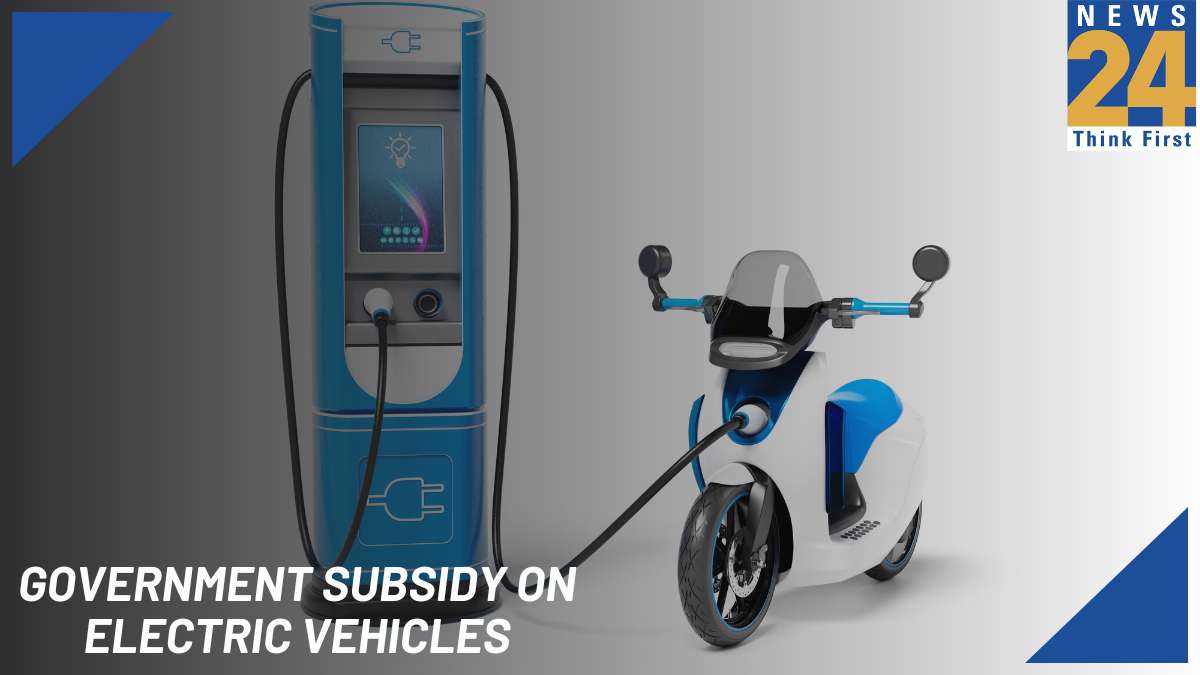Government Subsidy On Electric Vehicles In 2024: The Indian automobile industry is witnessing a paradigm shift towards a sustainable, eco-friendly transportation solution. In the last two years, the sales of electric vehicles (EVs) increased significantly.
In 2023, EV sales in India increased to 1.5 million (15 lakhs), a jump of 50% in comparison to 2022. The market share of electric vehicles out of the total automobile sales in India increased from 1.75% in 2021 to 6.38% in 2023.
Maximum growth was registered in the commercial EV market, with a growth rate of 169%. It is followed by the passenger EV category with 113%, the three-wheeler EV segment with 66%, and the two-wheeler EVs with 37%. According to a report by CareEdge, the two-wheeler and three-wheeler electric vehicles accounted for 90-to-95% of the total EV sales in 2023.
As per reports, government incentives and subsidies on electric vehicles played an important role in sustaining this growth.
Thanking the Indian Government for encouraging electric vehicle enthusiasts through revised FAME II scheme, offering 50% more subsidies for vehicles at ₹15,000/kWh and also for their charging stations in India. #Joyebike #RideTheChange #FutureIsElectric #Fame2 #ElectricVehicles pic.twitter.com/q9H0FkL49Z
— Joy E-Bike (@joy_ebike) June 17, 2021
Central Government Subsidy for Electric Vehicles in India: Its Role in EV Sales
Electric cars’ price is significantly higher than petrol/diesel run cars. Despite that factor, EVs maintained a robust growth in sales. The central government’s FAME II policy has reportedly played an important role in sustaining the growth momentum in 2023. Experts believe that government subsidies on electric vehicles will continue in 2024.
According to estimates, FAME II withdrawal will increase the prices of electric vehicles by around 25-to-30%. Therefore, a sudden withdrawal of subsidies, incentives, and current government support under the FAME II scheme is likely to adversely affect the increasing adoption rate of EVs in India.
FAME India Phase II Scheme: What is it?
FAME India Phase II stands for “Faster Adoption and Manufacturing of Electric Vehicles in India Phase II.” Under this scheme, Rs. 10,000 crores were allocated over 5 years, spanning from April 2019 to March 2024. This scheme was launched by the central government to promote electric vehicles for public and shared transport.
As per available data till December 1, 2023, MHI (Ministry of Heavy Industries) disbursed Rs 5,228 crore to EV manufacturers for selling 11,53,079 EV units under the FAME II scheme. It includes the sales of:
- 10,16,887 two-wheeler EVs
- 1,21,374 three-wheeler EVs
- 14,818 four-wheeler EVs
- 6862 e-buses
FAME II also supports the creation of EV charging infrastructure. To establish 7,432 public charging stations for electric vehicles, MHI has allocated a capital subsidy of Rs. 800 crore for oil marketing companies.
Also Read: Govt To Give Subsidy To Set Up EV-Charging Infra: Power Secy
Which State is Giving Subsidy on Electric Vehicles in India?
17 states in India provide subsidies for electric vehicles. They are:
- Delhi
- Maharashtra
- West Bengal
- Meghalaya
- Bihar
- Assam
- Gujarat
- Uttar Pradesh
- Odisha
- Rajasthan
- Tamil Nadu
- Karnataka
- Kerala
- Punjab
- Andhra Pradesh
- Madhya Pradesh
- Telangana
Monetary incentives and subsidies are predominantly given in the form of direct subsidies for buying EVs, incentives per KWH of battery capacity, and road tax exemptions.
-
State Government Subsidies on Electric Vehicles (Two Wheelers)
Delhi provides a maximum EV subsidy of Rs. 30,000, followed by Rs. 25,000 by Maharashtra. Rs. 20,000 subsidy is provided by West Bengal, Gujarat, Bihar, Assam, and Meghalaya. While Rajasthan offers Rs. 10,000, Odisha offers Rs. 5,000 subsidy.
100% road tax exemption is given by almost all these states except Madhya Pradesh (99%), Gujarat (50%), Kerala (50%), and Rajasthan (N.A.).
-
State Government Subsidies on Electric Vehicles (Four Wheelers)
Delhi provides a maximum electric car subsidy of Rs. 2,50,000 per EV. Rs. 1.5 lakh subsidy is given by Delhi, Gujarat, West Bengal, Bihar, and Assam. Odisha and Meghalaya provide EV subsidies of Rs. 1,00,000 and Rs. 60,000 respectively.
100% road tax exemption is given by most states except Madhya Pradesh (99%), Uttar Pradesh (75%), Gujarat (50%), Kerala (50%), and Rajasthan (N.A.).
Final Words
BMW India President, Vikram Pawah, has recently advocated in favour of continuing government subsidies on electric vehicles. He urged both central and state governments to continue subsidies in the form of lesser GST rates on EVs, road tax discounts, zero registration fees, and direct subsidies to the OEMs (original equipment manufacturers). Vikram Pawah underscored the point that India will be better in terms of economic, environmental, and technological perspectives if both central and state governments adopt electric vehicles.










